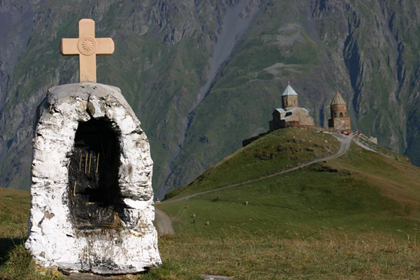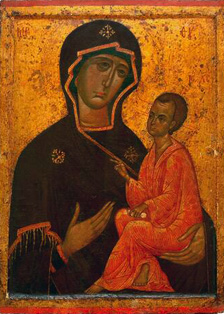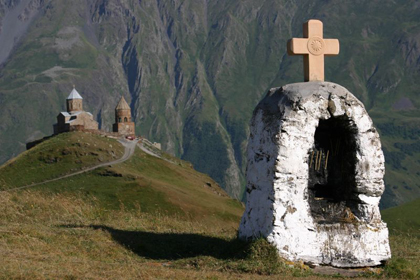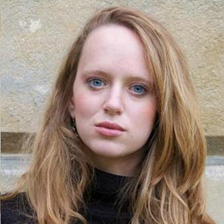To the Holy Mountain
by Tara Isabella Burton
Gergeti Trinity Church, Kazbegi. Nicolai Bangsgaard/Wikimedia Commons
It was Holy Week when they found him. His wallet was missing, along with one of his shoes, but they were all drunk and Nick was always passing out in cathedrals, and so it took them fifteen minutes to realize he was dead. Dato woke me up by throwing oranges at my window; they shouted for me to come down and look at the body, which they had dragged by the feet all the way from Sioni Street.
They needed me to go to the Embassy. I was a journalist, after all, and as a journalist I occupied a singular place in the taxonomy of expatriates. I was responsible enough to be trusted around bureaucrats, unimportant enough to have nowhere else to be. Besides, I was a woman, so I was probably still sober. Georgians never force women to drink
We put him on the snooker table to keep him out of reach of cats and pooled what little money we had, and then Dato argued with four different drivers in the meidan before one of them agreed to make the journey out to Digomi, and from time to time pull over in front of the courtyards strangers so that I could retch, vomit, sob.
The Embassy made no sense to me. I was too used to Tbilisi, to stone griffins with wind-battered wings and crumbling plaster angels, to cobblestones and choked ivy and warrens of alleyways that doubled back upon themselves, to my landlady’s splintering icons, which covered every unrotted inch of my wall. I was used to electricity that didn’t work, to mice that scrambled across my balcony, to the smell of grape-mold and the piss of tramps. To be here, all fluorescent lights and right-angles, was to be in some bright limbo of otherness: clean and well-ordered and so utterly out of sync with the city around it that I grew dizzy and had to sit down.
The security guard confiscated my lipstick and told me to make an appointment. I tried to explain that an American had died.
This did not convince him.
“Appointment,” he said. “Three days.”
“What am I supposed to do until then?”
He shrugged like a mystic and lit a cigarette.
In the end a passing functionary took pity on me. She pulled rank and flashed her card and ferried me, flanked by gunmen, to the clear, sharp rooms within.
Then there was the paperwork.
Nick hadn’t bothered to register anywhere. He’d simply stumbled in over the Turkish border, half-drunk, half-sick of shadows, settled like mold into the unmarked bar on Dadiani Street, to tell strangers the story of the girl he had loved, who was now a policeman’s whore. By midnight a dozen Georgians had bought him drinks, and by two in the morning he’d brought out his accordion, and at four o’clock my neighbor Dato rapped on my window and asked me if I had any spare bandages, and if I knew of anyone who wanted English lessons.
Nick’s memoir had never been written. It didn’t matter. We had all heard it, slurringly declaimed from the top of the fortress at strange, green hours.”
Nick played his accordion past midnight, spilled jam on the pool table, and put his drunk friends to bed in the hammock outside my window. After six months, we’d grown used to one another. I shouted at his houseguests, and every now and then he fixed my sink.
“On one condition,” he said. “I want you to read my memoir.”
Nick’s memoir had never been written. It didn’t matter. We had all heard it, slurringly declaimed from the top of the fortress at strange, green hours. He’d been living with his grandmother in Thessaloniki, teaching English, when he’d fallen in love with a Georgian girl studying there. He’d promised to marry her; he’d taken her virginity and then he’d changed his mind. Four months later he realized that he loved her, but by then she was back in Gori – the badly paid mistress of a Gori policeman – and would not speak to him.
“She doesn’t want to be happy. She’s too stubborn.” At night he spit chacha into the cracks between the cobblestones; at night he belched and buried his head in his hands. “I love her though.” She never returned his calls. He’d fall asleep facedown on a box of uneaten shawarma, and then I’d put him to bed.
I told the woman at the Embassy what we’d done with the body and she dabbed her fingernails with disinfectant and told me she’d take care of everything.
“We look after our own,” she said.
By now I was out of money, and so I walked home through Digomi, past the wedding-banquet halls, the new Justice Ministry, the half-built shopping mall on the outskirts of the city. I felt strangely, wildly homesick for the old town, for narrow alleys and imploded courtyards and trees bare of everything except persimmons, and so I started to run, and when at last I arrived in my own courtyard and gagged on the smell of sewage I was delirious with relief to be in my own filth again.
From my window I saw that the body was gone. Dato was downstairs playing with the cat, nudging it with his feet until it turned over on its back and began to swat his fingers with his paws. He looked up at me.
“Police. An hour ago.”
I told him to come upstairs.

Hodegetria of Tikhvin, Russia, c. 1300. Ghirlandajo/Wikimedia Commons
“You know how we found him, gogo?”
I didn’t want to know. “How?”
“In Sioni Cathedral. Under the Hodegetria icon,” he said. We both snorted. “Ridiculous, right?”
“Ridiculous.” My voice didn’t waver. “Nick was an atheist.”
“You know what Nino said to me?” He looked up at me. “She said last week Nick went to see Father Giorgi.”
A dead laugh erupted in my throat. “I don’t believe it.”
“It’s what Nino said. That he spent two hours and came out crying.” Dato did not smile, and it dawned that he was waiting for me to speak.
I could not speak. What had happened on the mountain had been an aberration, no more profound than the time he had vomited at the foot of the Narikala Fortress, than the antique sword he’d stolen from the Dry Bridge market, than the love-songs he played for his policeman’s whore.
“The blood’s still there,” said Dato. “You can still see it, if you want to.”
“I don’t want to.”
When Dato left I lit a cigarette. The sky rained down mud and the lights from the television tower on Mtatsminda cast an uncanny and candy-colored glow where the body had been.
*
We had decided on a whim, Nick and I. The city had folded in on us and the stench was too much for us and we couldn’t stand the yowling of the cats in the courtyard. He’d been getting threatening telephone calls from numbers we did not recognize, threatening to shatter his limbs if he contacted Maia again. I was behind on a story I’d been writing about refugees. The electricity had gone out and our downstairs neighbor had started beating his wife, and at three in the morning Nick knocked on my door and asked if I’d like to come with him to Mount Kazbek.
I told him he was crazy. Kazbegi was a four-hour drive in the best of weather; the pass was steep and unlit; we’d most likely go over the edge. I told him that he was being an idiot.
His laugh was great and beer-throttled, and there were flecks of ajika in his beard. “I don’t care. I mean – let’s do it, right? Let’s go anyway. Let’s take off our clothes under the stars, and make a fire, and call to the moon.”
“I don’t want to call to the moon,” I said.
“We can do it cheap.” Nick had a friend called Giga – a sober ex-military officer with seven fingers and bloodshot eyes – who would drive us there for a hundred lari and rent us tents and sleeping bags for another twenty-five. All we had to do was share the back seat with a sack of potatoes he wanted to drop off with his grandmother in Gudauri, and not complain too loudly about the smell.
In the end I gave in. Nick hadn’t bathed since Tuesday and I had another thirty interviews to transcribe and I’d set aside a mystery novel to read at the bathhouse and still Tbilisi was so cloyingly empty that I wasn’t sure I could stand another morning there.
We left at four, and were there by dawn.
“Fuck,” shouted Nick, and I rolled my eyes at him and still was secretly pleased, because I’d been thinking the same thing myself. “Fuck – Claire, look!”
Giga kept driving. He was used to this by now.
“Stop the car!” Nick took my hand and kissed it. He leaned out like a dog into the wind and when Giga jerked us to a halt six inches from the ravine he thrust forty lari into my hand and leaped into a snow-bank.
“Christ, I needed this.”
The mountain was wild and wide around us and the little lights from the village were blinking out, one by one, until we thought that we’d imagined them.”
We camped at the foot of the mountain, near the church, in the shadow of those great, trunk-like, quintessentially Georgian domes. Nick was surprisingly delicate in the construction of a fire, and we sat and shivered and ate stale shawarma out of a box.
“I never should have come back,” he said, at last.
I didn’t say anything.
“You know – Georgian girls are really religious? At least she was. Some of them, you know, they won’t eat meat on a Wednesday or Friday, but they’ll have, like, twenty abortions? Maia wasn’t like that. She wouldn’t let me fuck her – not for a long time. She really believed all that shit about virginity being a gift from God and souls becoming one. Shit like that.”
“Shit like that,” I said.
“In the end I talked her into it, because we were in love, you know? I wasn’t thinking. About her father, or her brother, or her bullshit pimp policeman. It was only after I left, you know, that I began to think it might have been true.”
“It’s not true.” I used to scandalize Dato by telling him I was an atheist, but with dogged dynamism he persisted in forgetting it.
“But if it was…”
“God doesn’t exist. And he doesn’t care who you’re fucking.”
“When I came back, I told her that we were meant to be together. That maybe God wanted us to be together.”
“What did she say?”
“She said she didn’t believe in God anymore.” He laughed. “Can you believe that?”
“How sad,” I said, instinctively, and grew angry with myself for having said it. “Then again, why should she?”
“What?”
“Believe.”
“Religious people are very happy,” said Nick. “My grandma’s religious. And she’s the happiest person I know.”
“I’m happy,” I said. “And I don’t believe in anything.”
The mountain was wild and wide around us and the little lights from the village were blinking out, one by one, until we thought that we’d imagined them, and because it was cold we huddled together and looked out at the church, which cut a swath of darkness out of the sky, and then because we’d grown too quiet for his liking Nick let out a thick and ventrical laugh and asked if I wanted to break into the bell-tower, just quickly, to say we’d done it?
“We couldn’t,” I said, because it was easier that way.
“What, you think they have CCTV up here?”
He had a point.
I let him lead me across the promontory. There was a narrow path that snaked from the stone cross to the church; the mountain sloped under us on all sides. He laughed and crowed something inane about living in the moment and because there was moonlight I could not refuse him.
“What would you be doing,” he asked me, as we walked into the shadow of the church, “if you were in Tbilisi right now?”
“Working hard,” I said. This was a lie. I’d have taken my laptop to the French restaurant on Meidan, where the rich foreigners go, and glutted myself on wasted time. “Reading, maybe.”
“I heard,” Nick said brightly, unperturbed, “that they used to store icons up here, when the Soviets came. To preserve them.”
I was tired and my legs ached from hiking and I wanted to go back to the tent, to our fire, but I told myself that this, this is what I’d come to Georgia for – mountain passes and adventures and the howling of wolves – and so I forced myself to follow him.
“We could just go back to the camp, you know. And say we’d done it.” The monks had left a pile of disused bricks on the side of the tower, which with subtle ingenuity and mild acrobatics could serve as a stepping-post.
He pulled me up by the forearms, and still shivering I stumbled into him, and then we both crawled under the largest bell to stay warm.
“This – this – is it!”
My feet were damp and my fingers had turned red, and yet I felt a wild, thrashing excitement, because in five years in Tbilisi I had never broken into a bell-tower, and I had never spent the night on a mountain, and because things were beautiful at last. Tbilisi had disappointed me and Georgia had disappointed me and yet we sat together in this tangle of darkness and I was less lonely than I had been.
“This is it,” I said.
“You know what I think we should do?”
“What?”
“We should ring the bell.”
“That’s ridiculous,” I said, less because I meant it than because it seemed the thing to say. My hands began to tremble and my joy began to flicker like candlelight. The possibility of it – sheer and surreal – was the most natural, and the most beautiful, thing in the world.
The beauty of it transfigured us, and alive with joy we rose up together and pulled the rope that held the clapper, and together we let the sound of it ring out over the mountain, and then because we had been bold we rang it again, and then the other bell, and we pulled with all our strength until there was no room for the stars because the sky was so full of sound.
It was so loud it deafened us. It rang long and it made our bones shiver, and then briefly I thought that it had moved me, as nothing else could or had: briefly that my soul would shear apart like a struck crystal. The sound was over; it hadn’t; I was what I had been.
“Fuck,” Nick whispered, and it was only when the moon emerged from behind a cloud that I saw he was crying. “Fuck!” He started so suddenly I thought a spider had bitten him, and then before I could say anything he threw himself back onto the bricks, then leaped down onto the earth and began to run towards the mountain.
A light went on further down, where the monks slept, and still stupid with shock I thought that this was what had sparked him, and began to follow after. But he was faster than I was, and stronger, and he did not stop at the campsite but rather kept going into the darkness, and whipped on by thoughts of Kazbegi jail, I ran too.
I found him two hours later, in the woods halfway down the mountain. He was naked; he was shaking. His face was hot with sweat and his eyes were wild and he took hold of my shoulders and shook me so violently that bile rose in my throat.

Gergeti Trinity Church, Kazbegi. Nicolai Bangsgaard/Wikimedia Commons
“Did you feel that?” He was laughing and sobbing and crowing and swooning all at once. “And did you see it?”
“See what?”
“Right there, in the mist!”
“I didn’t see anything.”
“She was right there!”
It shouldn’t have surprised me. Of course Nick, drunk on chacha and in love with his own malformed prophecies, would have seen something in the mountains. Of course he would have invented, out of his riotous selfishness, a vision presented to him and him alone.
“Who?”
Nick’s grip was tight on my wrists; it left marks. He spluttered, started to cough; I wanted to slap him. “My grandmother – she had this icon in her bedroom, right? The Hoggedy – fuck, I don’t know what it’s called. The one with Mary pointing – you know what I mean!”
“I don’t know what you mean.”
“It was just like that! She had it in her arms, you know, the kid, him, and she was pointing, and…and…fuck!”
I told him that he was drunk.
“I ran after her. She wanted me to follow her. So I followed her…”
I wanted to laugh – at the hair bristling on his chest, at his shriveled penis, at his tangled hair and the dirt on his feet. I tried to laugh and couldn’t. I had laughed at him before – when he told stories at the fortress, and when he got drunk and tried to swim in the Abanotubani canal – but now he was drunk and naked and his eyes were bright and I discovered that I hated him. I pictured him telling the story at the Salve Bar, tourists topping up his pint glass, and it infuriated me.
“I saw her,” he said again, and like a child he fell into my arms and against my breast; he wept.
I took him back to the tent; I dressed him and wiped away the dirt with hand-sanitizer. I put him to bed and then I relit the fire and looked out again over the mountain, just in case.
I don’t know what I expected. It was as it was, and is, and always would be: the sky was wide and the earth was dark and no light flamed through it. I did not weep or speak in tongues, but remained whole, quiet and within myself, and within the world that was the same world I had known, and I knew that I would never see her pointing the way to salvation, bouncing a child in her arms, and I hated her for not having chosen me.
Once I’d believed that somewhere, in some city, in some mold-stewing bed in some courtyard flat, I’d fall asleep to the meandering of stars, and that God would find me there.
There had been sunsets and there had been war zones and there had been mornings in my sweatpants eating matsoni out of a dirty bowl on the terrace and God and I had never encountered one another there.
I sat awake until dawn.
I thought that Nick might appear from the tent sheepish, hungover: green and unbelieving. But when he emerged his face was lit with joy, and I knew that I had lost him.
“Do you believe me now?”
“Honestly?”
“Honestly.”
“No.”
Giga drove us back to Tbilisi in silence.
*
The night before he died, Nick knocked at my window and told me that he was going to visit Maia once last time. He’d asked her to meet him in front of the Sioni Cathedral, and at last she had agreed. He had bought every rose in Tbilisi, he said. He was going to tell her that she had been right, and that the universe had bound them, and that what God had united no man would tear asunder. He was going to ask her to marry him, and this time she’d believe him, because he was serious, now, as he had never been serious before. He had been fasting for Holy Week, he told me. He’d written to his grandmother in Thessaloniki, and told her to start planning an Orthodox wedding. He’d gone to see Father Giorgi. He told me he hoped I believed in him now.
I didn’t answer.
Maia didn’t come to the funeral.
On Easter, when Holy Week was over and the bells could ring again, I put on a headscarf and a long skirt and went to the basilica. It was hot and close and I could not breathe, but only stand cheek to cheek and breast to breast with strangers. The crowd spilled out into the courtyard, and women kissed the doors and the walls and forced their way inside to fling their faces against the floor. I lit a candle in his name and we all sang together and I felt nothing.
They’d cleaned the Hodegetria by now, and men were kissing it, and because I could not pray for him I kissed it too.
I felt nothing, but I wept for him, and weeping I kissed it again and again, until one of the women marveled at my faith, and took me in her arms.

Author portrait by Palmyre Manivet
Tara Isabella Burton‘s fiction has appeared or is forthcoming in Arc, Shimmer, [PANK] and more. Her essays, reviews and travel writing can be found at Los Angeles Review of Books, The New Statesman, Salon, Guernica, VICE, Condé Nast Traveller and many other places. She is the winner of The Spectator’s 2012 Shiva Naipaul Memorial Prize for travel writing and the author of the novel A Thief in the Night, which is currently on submission. Tara was born in New York and now lives in Oxford, where she is currently a Clarendon Scholar at Trinity College, working on a doctorate in theology and fin-de-siècle French literature.
taraisabellaburton.com

